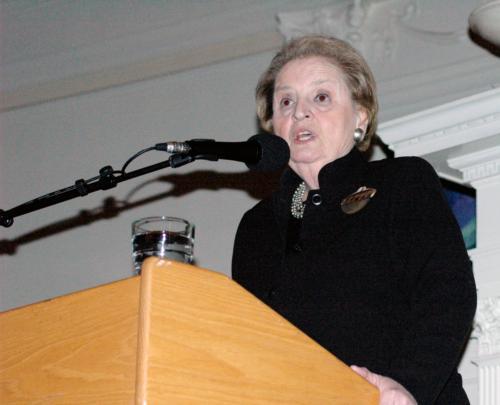
News
Harvard Alumni Email Forwarding Services to Remain Unchanged Despite Student Protest

News
Democracy Center to Close, Leaving Progressive Cambridge Groups Scrambling

News
Harvard Student Government Approves PSC Petition for Referendum on Israel Divestment

News
Cambridge City Manager Yi-An Huang ’05 Elected Co-Chair of Metropolitan Mayors Coalition

News
Cambridge Residents Slam Council Proposal to Delay Bike Lane Construction
Albright Blasts Bush’s Foreign Policy During Visit
Clinton-era diplomat calls for U.S. to reestablish international credibility

Former Secretary of State Madeleine Albright excoriated President Bush’s foreign policy in front of a sold-out crowd at the First Parish Church on Monday evening. She said she had never “seen the world in such a mess” and referred to the United States as a brand that has been “severely tarnished.”
In a discussion of her new book “A Memo to the President Elect: How We Can Restore America’s Freedom and Leadership,” Albright emphasized the importance of the 2008 election and the need for the next president to reestablish the country’s credibility on the world stage.
The Czechoslovakia-born Albright served as America’s top diplomat during President Bill Clinton’s second term, from 1997 to 2001. She is supporting Sen. Hillary Rodham Clinton, Democrat of New York, in the upcoming election, but she did not comment extensively on the Democratic race during her appearance.
“The kind of leader I want is a confident leader,” Albright said. “Somebody who knows what his or her principles are but is confident enough to listen to a lot of different ideas.” Later, in response to a question from an audience member, Albright said that Hillary Clinton fit the bill.
Albright outlined five major issues—terrorism, the proliferation of nuclear weapons, the tarnished reputation of democracy, globalization, and global warming—that the next president will have to deal with in cooperation with the United States’ allies.
Albright discussed two “hot wars”—Iraq and Afghanistan—and their unintended consequences that the next president will have to tackle. She called the volatility in Pakistan the biggest unintended consequence of the war in Afghanistan.
“Pakistan is a combination of everything that gives you an international migraine—there’s terrorism, nuclear weapons, extremism, poverty, corruption,” Albright said.
During the question-and-answer session that followed her 20-minute speech, Albright fielded queries regarding her actions as secretary of state. Audience members challenged her inaction during the Rwandan genocide and her support for economic sanctions against Iraq that, according to UNICEF, were responsible for the deaths of 500,000 Iraqi children. Albright forcefully disowned her contention in 1996 that the Iraq sanctions were worth that price.
“I made the stupidest statement I have ever made in saying that the sanctions were worth it,” she said.
Audience members generally came away impressed with Albright, calling her honest and forthright.
“I thought she was highly articulate and very impressive, and very gracious when confronted with hostile questions,” said Mary Dalton Greer, an audience member who received a Harvard doctorate in music in 1996. Some felt that Albright should have addressed specific ways she would deal with the issues she presented in her book.
“It would have been more interesting if she had gone into specifics on a few issues,” said Thomas A. Sampson, a doctoral candidate in economics. “She said she didn’t think the Iraq war was a good idea and that it’d be a good idea if it ended but she didn’t talk at all about the specifics about how you might withdraw troops without causing more problems than there are already.”
—Staff writer Lucy Chen can be reached at lucychen@fas.harvard.edu.
Want to keep up with breaking news? Subscribe to our email newsletter.
